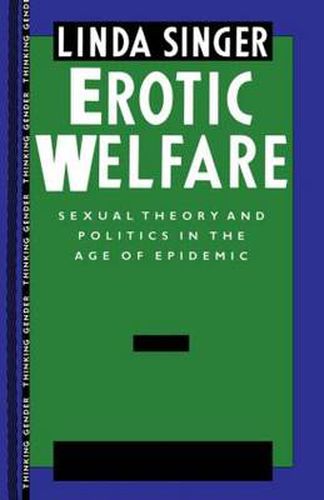Readings Newsletter
Become a Readings Member to make your shopping experience even easier.
Sign in or sign up for free!
You’re not far away from qualifying for FREE standard shipping within Australia
You’ve qualified for FREE standard shipping within Australia
The cart is loading…






The emergence of AIDS in contemporary culture has not only produced a vast discourse on the disease but has provoked an anxious proliferation of sites of erotic danger. In Erotic Welfare , Linda Singer argues that we are currently living in an age of epidemic , fueled by a panic logic in which contemporary discourse on sexuality and on a variety of social problems - teenage pregnancy, prostitution, and drug addiction, have come to replicate the discourse of contagion. Singer traces the effects of epidemic on the growth of regulatory mechanisms for the control of sexuality, and explores the ways this development has affected women’s efforts to secure reproductive freedom; the construction of femininity within the media; and efforts to displace the hegemony of the nuclear family in the cultural imaginary. Her work forms a trenchant critique of sexuality in an age of discipline, where bodies and their pleasures have become dense sites of regulatory power.
$9.00 standard shipping within Australia
FREE standard shipping within Australia for orders over $100.00
Express & International shipping calculated at checkout
Stock availability can be subject to change without notice. We recommend calling the shop or contacting our online team to check availability of low stock items. Please see our Shopping Online page for more details.
The emergence of AIDS in contemporary culture has not only produced a vast discourse on the disease but has provoked an anxious proliferation of sites of erotic danger. In Erotic Welfare , Linda Singer argues that we are currently living in an age of epidemic , fueled by a panic logic in which contemporary discourse on sexuality and on a variety of social problems - teenage pregnancy, prostitution, and drug addiction, have come to replicate the discourse of contagion. Singer traces the effects of epidemic on the growth of regulatory mechanisms for the control of sexuality, and explores the ways this development has affected women’s efforts to secure reproductive freedom; the construction of femininity within the media; and efforts to displace the hegemony of the nuclear family in the cultural imaginary. Her work forms a trenchant critique of sexuality in an age of discipline, where bodies and their pleasures have become dense sites of regulatory power.